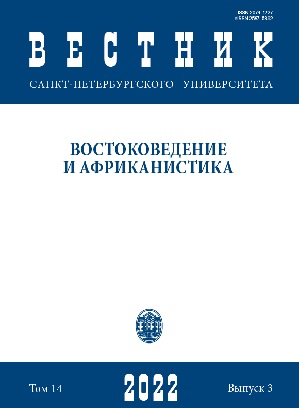Socio-cultural Activities of the Russian Imperial Consulate in Yingkou (China) during the Period of Temporary Russian Administration (1900-1904)
DOI:
https://doi.org/10.21638/spbu13.2022.302Abstract
Starting from the mid-1890s, Manchuria came into the sphere of political interests of Imperial Russia in China. From 1896 to 1898, a number of Russian-Chinese agreements were made on mutual cooperation, the construction of the Chinese Eastern Railway, the Russian-Chinese Bank, the lease of Chinese territories, security, etc. Situated on the coast of the Liaohe River in South Manchuria, the city of Yingkou played an important role in this mutually beneficial process. Yingkou, a tractate port, was called the “Gate of Manchuria”, it has been known since 1861 as a center of junk trade and a center of commercial activity. The Russian presence increased here from 1896, and in 1899 a Russian imperial consulate was opened here. The city played a big role in economic and political cooperation during the construction of Port Arthur and Dalian. Starting from 1900, the order of the Russian Temporary Administration was introduced in Yingkou, which significantly strengthened Russia’s position in the region. Diplomats were appointed to the posts of mayors - Russian consuls in the port city: A. N. Ostroverkhov and V. F. Grosse. Among the many questions associated with solving diplomatic, commercial and organizational issues were issues of socio-cultural activities. The article describes details and analyzes the measures initiated and carried out in Yingkou, mainly at the expense of Russian funds, connected to the anti-epidemiological situation, the fight against plague, specific measures to improve the sanitary condition of the city; considers issues related to the improvement of urban infrastructure, security and social sphere; speaks about the opening of the Russian-Chinese school and its importance for the promotion of the Russian language in China. The article uses a large number of archival sources which are introduced into scientific circulation for the first time.
Keywords:
Russia, South Manchuria, Yingkou (Newchwang/Newzhuang), Temporary Russian Administration, Russian Imperial Consulate, mayor, V. F. Grosse, foreign policy, socio-cultural events
Downloads
References
Downloads
Published
How to Cite
Issue
Section
License
Articles of "Vestnik of Saint Petersburg University. Asian and African Studies" are open access distributed under the terms of the License Agreement with Saint Petersburg State University, which permits to the authors unrestricted distribution and self-archiving free of charge.





